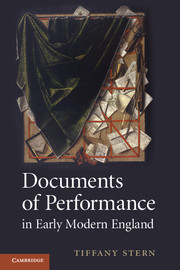Book contents
- Frontmatter
- Contents
- Acknowledgements
- Textual note
- Introduction: Playwrights as play-patchers
- 1 Plot-scenarios
- 2 Playbills and title-pages
- 3 ‘Arguments’ in playhouse and book
- 4 Prologues, epilogues, interim entertainments
- 5 Songs and masques
- 6 Scrolls
- 7 Backstage-plots
- 8 The approved ‘book’ and actors' parts
- Conclusion: Repatching the play
- Notes
- Bibliography
- Index
4 - Prologues, epilogues, interim entertainments
Published online by Cambridge University Press: 18 December 2009
- Frontmatter
- Contents
- Acknowledgements
- Textual note
- Introduction: Playwrights as play-patchers
- 1 Plot-scenarios
- 2 Playbills and title-pages
- 3 ‘Arguments’ in playhouse and book
- 4 Prologues, epilogues, interim entertainments
- 5 Songs and masques
- 6 Scrolls
- 7 Backstage-plots
- 8 The approved ‘book’ and actors' parts
- Conclusion: Repatching the play
- Notes
- Bibliography
- Index
Summary
INTRODUCTION
‘Let fancy’, shrugs the Prologue to George Powell's Alphonso (1691), ‘save my Play,/And then I'll laugh at Wits on my Third Day.’ What he is saying is that he hopes the audience will accept his play by applauding it. Provided they do so, Alphonso will be put on at least another two times; if the reverse happens and it is ‘damned’, it will never be staged again. Powell is particularly anxious that the play survive to ‘my Third Day’ because the third day was, in his time, the ‘benefit’ performance: the performance for which the author would be given a portion of the revenue as part-payment for his text. Because benefit performances were the major (and sometimes only) payment that playwrights received for their writing, cruel ‘wits’, whose taunting might result in a play's ‘damnation’ (in which case it would never be performed again – meaning there would be no third night), were a constant threat. As is clear from the prologue's concerns and frame of reference, this particular discourse is written specifically for the play to which it is attached, but is nevertheless not a permanent feature of that script. It belongs to the play at one crucial moment of its performance life, and is therefore angled, not towards all audiences, but towards the audiences who will determine the play's survival to the benefit – which is to say, the audiences who will attend days one and two of the production. Nor is this prologue unique.
- Type
- Chapter
- Information
- Documents of Performance in Early Modern England , pp. 81 - 119Publisher: Cambridge University PressPrint publication year: 2009



